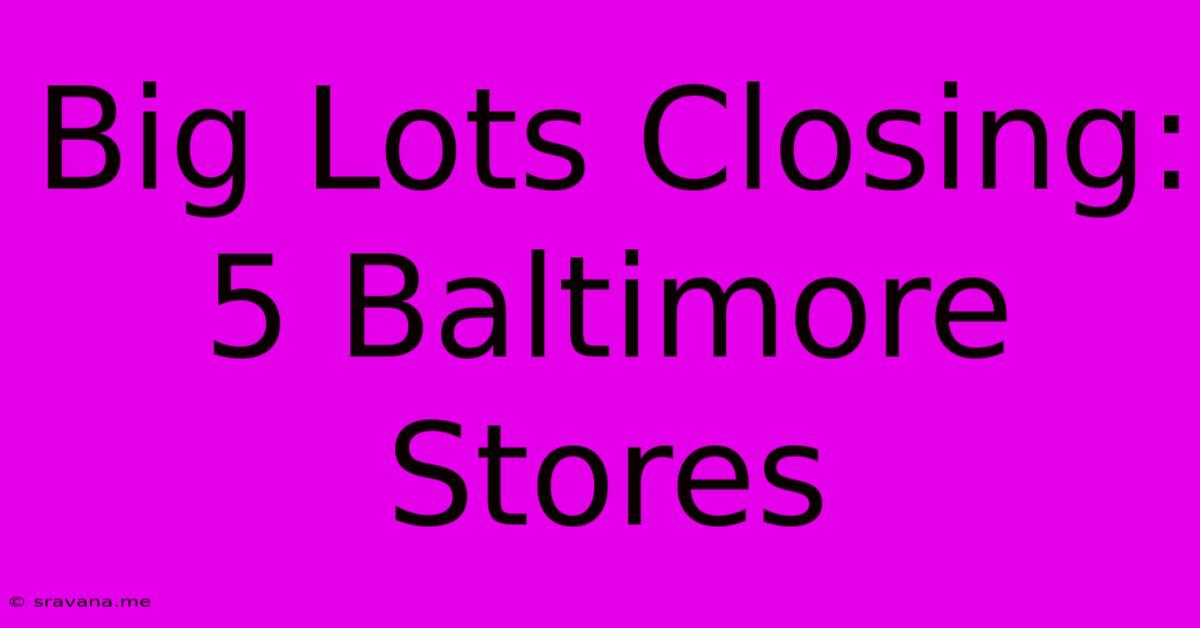Big Lots Closing: 5 Baltimore Stores

Discover more detailed and exciting information on our website. Click the link below to start your adventure: Visit Best Website sravana.me. Don't miss out!
Table of Contents
Big Lots Closing: 5 Baltimore Stores - What This Means for Shoppers and the City
The recent announcement that five Big Lots stores in Baltimore are closing has sent ripples through the community. This isn't just about the loss of a discount retailer; it's a reflection of larger economic trends impacting retail landscapes across the nation, and particularly in Baltimore. This article delves into the reasons behind these closures, their impact on Baltimore residents, and what the future might hold for both Big Lots and the city's retail scene.
Why are these Baltimore Big Lots stores closing?
While Big Lots hasn't explicitly stated the reasons for these specific store closures in Baltimore, several contributing factors are likely at play. These include:
1. Changing Retail Landscape: The retail industry is undergoing a massive transformation. E-commerce giants like Amazon have dramatically altered consumer shopping habits, forcing brick-and-mortar stores to adapt or face closure. Big Lots, while offering discounted goods, still faces the challenge of competing with online retailers' convenience and often lower prices.
2. Economic Factors: Baltimore, like many urban areas, faces economic challenges. Factors like fluctuating property values, increased operating costs (including rent and labor), and shifting demographics can significantly impact the viability of retail businesses. These economic pressures can make it difficult for even established retailers like Big Lots to maintain profitability.
3. Competition: Big Lots operates in a competitive market. Discount retailers such as Dollar General, Dollar Tree, and even larger players like Walmart and Target, all compete for the same customer base. Increased competition can put pressure on profit margins, making it challenging to remain sustainable in certain locations.
4. Supply Chain Issues: The lingering effects of the global pandemic and subsequent supply chain disruptions continue to impact businesses across the board. Increased costs for goods and unpredictable delivery times can significantly affect a retailer's profitability and ability to stock shelves with popular items.
Impact on Baltimore Communities
The closure of five Big Lots stores in Baltimore will have several consequences for the affected communities:
1. Job Losses: The most immediate impact is job losses for employees at the closing stores. These closures will displace numerous workers, requiring them to seek new employment opportunities. The ripple effect of these job losses can extend to the wider community, impacting local economies.
2. Reduced Access to Goods: Big Lots serves a vital role for many Baltimore residents, particularly those in lower-income neighborhoods, by providing access to affordable goods. The closure of these stores means reduced access to essential household items, groceries, and other discounted products. This can disproportionately affect vulnerable populations.
3. Impact on Local Businesses: The closures could also impact smaller businesses nearby. Big Lots stores often attract foot traffic to surrounding businesses, contributing to the overall vibrancy of the local commercial areas. The closure of these stores could lead to decreased foot traffic and potential revenue loss for nearby establishments.
4. Vacant Properties: The empty retail spaces left behind by the closing stores pose another challenge for Baltimore. Vacant properties can become eyesores, attracting vandalism and negatively impacting neighborhood aesthetics. The city will need to develop strategies to address these vacant properties and attract new businesses to revitalize these areas.
What's Next for Big Lots and Baltimore?
The future remains uncertain for both Big Lots and the affected Baltimore communities. Big Lots may focus on streamlining its operations, closing underperforming stores, and investing in its online presence. For Baltimore, addressing the economic challenges contributing to the closures is crucial. This includes:
1. Investing in Infrastructure: Improvements in infrastructure, such as better transportation and public amenities, can attract new businesses and improve the overall appeal of the city.
2. Supporting Local Businesses: The city can implement policies and initiatives to support small and medium-sized businesses, fostering local entrepreneurship and creating diverse employment opportunities.
3. Attracting New Retailers: Attracting new retailers to fill the vacant spaces left behind requires creative strategies, including offering incentives to attract businesses to these locations. This could include tax breaks, reduced rent, or other support programs.
4. Addressing Economic Inequality: Addressing economic inequality and providing access to resources for low-income residents is essential. This could include job training programs, affordable housing initiatives, and access to financial literacy resources.
Conclusion: A Call for Collaboration
The closure of five Big Lots stores in Baltimore is a significant event that requires a collaborative effort from all stakeholders. The city, community organizations, and businesses need to work together to mitigate the negative impacts of these closures and foster economic growth and development. Addressing the underlying economic challenges, investing in infrastructure, and supporting local businesses are crucial steps in ensuring a vibrant and resilient future for Baltimore. The loss of these stores highlights the need for a robust and adaptable retail strategy in the face of changing consumer habits and economic pressures. The focus should be on creating a more sustainable and equitable future for all Baltimore residents. The situation serves as a critical wake-up call for both the city and national retail landscapes, emphasizing the importance of adapting to the evolving world of commerce.

Thank you for visiting our website wich cover about Big Lots Closing: 5 Baltimore Stores. We hope the information provided has been useful to you. Feel free to contact us if you have any questions or need further assistance. See you next time and dont miss to bookmark.
Also read the following articles
| Article Title | Date |
|---|---|
| Fair Catch Kick Dickers Milestone | Dec 23, 2024 |
| Louisville Penn State Vie For Volleyball Crown | Dec 23, 2024 |
| Louisvilles Semifinal Victory Over Pitt | Dec 23, 2024 |
| Louisville Targets 2024 Ncaa Volleyball | Dec 23, 2024 |
| Louisville In 2024 Ncaa Volleyball | Dec 23, 2024 |
